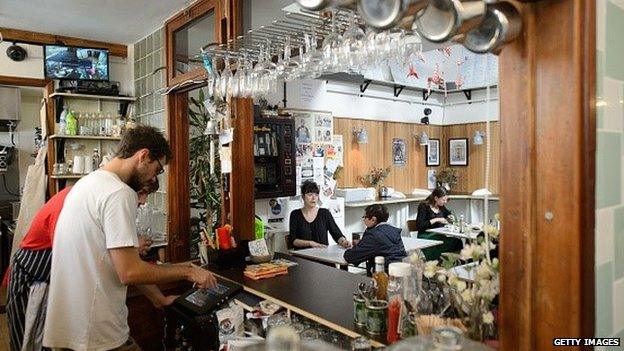Little growth without shoppers
- Published
- comments

The services sector, which includes restaurants, has underpinned economic growth in the UK this year
So before any of you get too gloomy, the recovery is not over.
GDP, or national income, increased at an annual rate of 2.4% in the first three months of the year, which looks pretty good by international standards - and is only a touch slower than the 2.5% forecast for this year made in the Budget by the government's official forecaster, the Office for Budget Responsibility.
But the quarter-on-quarter growth rate does not look quite so rosy: the economy expanded by just 0.3% in the three months to the end of March, compared with the previous quarter.
That was half the growth rate we enjoyed in the last three months of 2014 and the slowest rate of growth since the end of 2012.
What's going on?
For reasons no one can quite explain, construction in Britain has been lousy for six months.
The production industries have been especially hurt by the oil price collapse, which has led to something of a crisis in the North Sea. Excluding oil and gas, quarter-on-quarter growth would have been 0.1 of a percentage point higher at 0.4%.
But nor has manufacturing been sparkling: it showed growth of just 0.1%. And perhaps because of the strengthening pound, the growth rate of our manufacturers has progressively decelerated in a straight line from 1.4% a year ago
More unexpectedly, some service industries in which the UK is a world leader - finance, engineering and architecture - have had a poor few months.
One possible explanation of their slowing growth is that demand for our services and goods in important export markets - especially China and the US - may be a bit worse than official figures show. That could be a sign of trouble ahead.
Hospitality saves the day
So thank goodness for our domestic-facing services.
Or to put it another way, if we weren't a nation of shoppers and restaurant eaters, there would be very little growth at all. The output of distribution, hotels and restaurants increased by 1.2% in the quarter - only slightly slower than at the end of last year.
In fact shops, hotels and restaurants contributed two thirds of all growth in the latest quarter.
Which brings us to a couple of big and important points.
The most politically resonant one is that the Tory and Lib Dem government has failed in its ambition to rebalance the economy more towards manufacturing.
The last official figures before the general election show that the manufacturing sector is still 4.8% smaller than before the great crash and recession - whereas the much larger service sector is now even bigger: 8.5% bigger than before the crash.
In other words, we are more dependent on service industries than we've ever been in our history.
And not only have services become a big proportion of the economy, some 78% of it, but they actually contributed more than 100% of all the growth we enjoyed since the end of December (because production and construction made negative contributions).
Manufacturing growth stalls
To be clear, the ascendance of services may not be a disaster: we have many world-beating service businesses, many services are capable of being exported, and services can therefore help the UK to pay its way in the world (something which hasn't happened for 30 years, as you know).
But since the Business Secretary Vince Cable and the Chancellor George Osborne both set great store on increasing the importance to Britain of manufacturing, it is worth pointing out that the shift to the makers has not happened - or at least not yet.
Point number two is a related one: although we should all probably be grateful that we are still spending in shops and cafes, and keeping the economy moving forward, history suggests it will all end in tears if we don't see a revival of other sources of growth - namely exports and business investment.
Right now much of our spending and consumption is being spurred by the windfall we've received from lower prices of essentials, namely food, petrol and energy. That's given us more spending power.
But the concern would be that we'll start to buy too much on credit once again, at a time when millions of households are still burdened by record debts - and are only able to afford those debts because the official Bank of England interest rate remains close to zero.
So hip hooray that the recovery continues.
But what the figures show is that there remains a massive job for the next government to reconstruct our economy so that prosperity can be generated in a more sustainable long-term way.
No government can magic away boom and bust. But governments do have the ability to flatten the business cycle so that busts become less pronounced - and that goal has not yet been achieved.